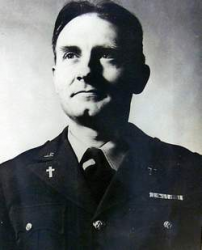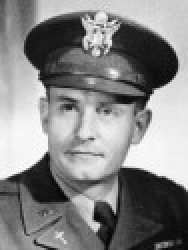
 |
|
|
||
|
Emil Joseph Kapaun |
||||
|
Engagements: • World War II (1941 - 1945)• Korean War (1950 - 1953) |
||||
| Biography: | ||||
|
Emil Joseph Kapaun Emil Joseph Kapaun was born on 20 April 1916 in Pilsen, KS, to Enos and Elizabeth Kapaun, Czech immigrants. Kapaun attended and graduated from Pilsen High School in May 1930. He graduated from Conception Abbey Seminary College in Conception, MO, in June 1936. He then attended Kenrick Theological Seminary (now Kenrick-Glennon Seminary), St. Louis, MO. On 9 June 1940, Kapaun was ordained a priest at what is now Newman University in Wichita, KS. He celebrated his first Mass at St. John Nepomucene in Pilsen, Kansas. Military Service Kapaun joined the U.S. Army in July 1944 and began his military chaplaincy at Camp Wheeler, GA, in October 1944. He and one other chaplain ministered to approximately 19,000 service men and women. He was sent to India and served in the Burma Theater. Kapaun was promoted to Captain in January 1946 and returned stateside in May 1946. He was discharged in 1946 and went to the Catholic University of Washington where, in 1948, he earned an M.A. in Education. In September 1948, he re-enlisted in the Army. He resumed his chaplaincy at Fort Bliss, El Paso, TX. Kapaun left his parents and Pilsen for the last time in December 1949. In January 1950 he was stationed near Mt. Fuji, Japan, as a military chaplain and remained there until July 1950, when he was ordered to Korea a month after North Korea invaded South Korea. In the same month, Kapaun's Unit, the 35th Brigade from Ft. Bliss, landed in South Korea during a big invasion. He was constantly on the move northward until his capture by Chinese Communists in November 1950 near Unsan, North Korea. After being taken prisoner in 1950 by the Chinese, Kapaun nursed the sick and wounded at a squalid communist P.O.W. camp in North Korea, until a blood clot in his leg prevented his daily rounds. He was moved to a hospital and allowed to die from starvation and pneumonia. He died on 23 May 1951 and was thrown into a mass grave along with other mistreated American prisoners along the Yalu River. After the war, the Chinese plowed the field and planted it over with rice to hide the site. Medals and Awards Medal of Honor Possible Medal of Honor In 2000, U.S. Rep. Todd Tiahrt (R-Kan.) began a campaign to award the Medal of Honor to Kapaun. Before leaving office on 16 September 2009, Secretary of the Army Pete Geren sent Tiahrt a letter, agreeing that Kapaun was worthy of the honor. Admiral Michael Mullen, Chairman of the Joint Chiefs of Staff, also agreed. Seven chaplains have been awarded the Medal of Honor. Tiahrt hopes the U.S. Congress will approve a bill awarding the Medal of Honor to Kapaun, for signing by President Barack Obama. Medal of Honor Awarded The National Defense Authorization Act for Fiscal Year 2012 (Senate Bill 1867, Section 586) contained an authorization and a request to the President to award the Medal of Honor to Kapaun posthumously for acts of valor during the Battle of Unsan on 1 and 2 November 1950, and while a prisoner of war until his death on 23 May 1951. President Obama presented the Medal of Honor to Kapaun's nephew at the White House on 11 April 2013. Citation Chaplain Emil J. Kapaun, while assigned to Headquarters Company, 8th Cavalry Regiment, 1st Cavalry Division, distinguished himself by extraordinary heroism, patriotism, and selfless service between Nov. 1-2, 1950. During the Battle of Unsan, Kapaun was serving with the 3rd Battalion of the 8th Cavalry Regiment. As Chinese Communist forces encircled the battalion, Kapaun moved fearlessly from foxhole to foxhole under direct enemy fire in order to provide comfort and reassurance to the outnumbered Soldiers. He repeatedly exposed himself to enemy fire to recover wounded men, dragging them to safety. When he couldn't drag them, he dug shallow trenches to shield them from enemy fire. As Chinese forces closed in, Kapaun rejected several chances to escape, instead volunteering to stay behind and care for the wounded. He was taken as a prisoner of war by Chinese forces on Nov. 2, 1950. After he was captured, Kapaun and other prisoners were marched for several days northward toward prisoner-of-war camps. During the march Kapaun led by example in caring for injured Soldiers, refusing to take a break from carrying the stretchers of the wounded while encouraging others to do their part. Once inside the dismal prison camps, Kapaun risked his life by sneaking around the camp after dark, foraging for food, caring for the sick, and encouraging his fellow Soldiers to sustain their faith and their humanity. On at least one occasion, he was brutally punished for his disobedience, being forced to sit outside in subzero weather without any garments. When the Chinese instituted a mandatory re-education program, Kapaun patiently and politely rejected every theory put forth by the instructors. Later, Kapaun openly flouted his captors by conducting a sunrise service on Easter morning, 1951. When Kapaun began to suffer from the physical toll of his captivity, the Chinese transferred him to a filthy, unheated hospital where he died alone. As he was being carried to the hospital, he asked God's forgiveness for his captors, and made his fellow prisoners promise to keep their faith. Chaplain Kapaun died in captivity on May 23, 1951. Chaplain Emil J. Kapaun repeatedly risked his own life to save the lives of hundreds of fellow Americans. His extraordinary courage, faith and leadership inspired thousands of prisoners to survive hellish conditions, resist enemy indoctrination, and retain their faith in God and country. His actions reflect the utmost credit upon him, the 1st Cavalry Division, and the United States Army. Death Emil Joseph Kapaun died while a prisoner of war on 23 May 1951 in North Korea. His body could not be recovered. A memorial for Kapaun is located at the Pilsen Cemetery in Pilsen, KS. |
||||
| Honoree ID: 2690 | Created by: MHOH | |||
Ribbons
Medals
Badges
Honoree Photos
 |  |  |
 |  |
 |


